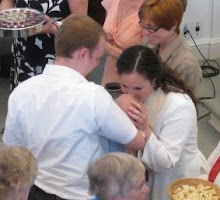You may have heard about Ann Coulter's recent comments on Donny Deutsch's show, "The Big Idea" in which she states that in her ideal world, Jews would become "perfected" by becoming Christians and the world would look like the Republican National Convention from 2004. I'm sure you'd be shocked to learn that in Ann Coulter's ideal world- everyone would look and act just like her (that was sarcasm, in case you missed it). You can watch her comments here.
Now, for me, the most obvious reaction to Ann Coulter is one of disgust. Her comments are indisputably offensive, inaccurate of the Christian tradition, and frankly, anti-semitic. She states that Christians have the "fed-ex" version of salvation and she infers that Christian's hope for Jews to come to their senses and convert. Not only does it degrade the faith of our Jewish brothers and sisters, but it also speaks broadly and inaccurately about Christians who do not hold this belief.
However, perhaps it is not simply our disgust at Ann Coulter's words that grate on our nerves. Perhaps there is something more. Maybe we see ourselves in Ann Coulter and we are embarrassed. Ann Coulter talks about what her ideal world would look like, which was essentially, white, conservative Christians, ie. people who agree with her. While we can justly criticize Ann Coulter's remarks, can we also justly hold a mirror to ourselves? How many of us, when asked about their ideal world- would have people like Ann Coulter in it? In some way, however, covert, we may think, "In my ideal world, everyone would believe the same things I believe, because my beliefs are the best ones." To be frank, we all have visions of our "ideal world", and they usually don't include "the other"- particularly when they differ from us on political and social issues.
If we can be honest and acknowledge that we are about as forgiving of Ann Coulter as she is forgiving of liberals--- then we can allow the bigger question to emerge- if we hold that all people are made in the image of God- and we are to honor God's creation-- how do we respond to people like Ann Coulter in a way that both honors their perspective and yet bears prophetic witness? If both of our images of the "ideal world" don't include the other (Ann Coulter is not in mine, and I'm damn sure I'm not in hers...)- then how do we communicate? And finally- the most pressing question-- how do we communicate when we have fundamentally different perspectives on what it means to be Christian or faithful? Do I even want peace with Ann Coulter- a person whom I consider to be bigoted and prejudiced? Does she want peace with me- a person who she would probably see as a bleeding-heart liberal? These are just a few of the questions that emerge after I hear the words of Ann Coulter and feel my blood pressure rise and my embarrassment of her description of Christians emerges.
I think my point is this: we find it easy to criticize the other (and sometimes they deserve it)-- but it is also important that we hold the mirror of criticism up to our own face- and examine what beliefs systems we have- what beliefs we privilege and what perspectives we honor. Perhaps this is where we will find- we do not always differ so much from our "enemy" as we might hope.
Subscribe to:
Post Comments (Atom)

2 comments:
The challenge of being accepting, not meaning agreement, with the other is the key. You said it. The conditions for this discussion are contained in your rules for the blog, i.e. no hateful or derogatory remarks. Coulter might hold defensible positions, but her behavior, her very eagerness to be hateful, eliminates her from the discussion. She is not to be taken seriously. Bacsi
I think there's no excuse for Ms. Coulter's insulting bigotry. The only way I can honor her perspective is by believing she doesn't know better, and that insults her intelligence. Hmm...
However, I wonder if "the other" isn't almost necessary? The venerable Thich Nhat Hanh once said that political liberals should be grateful there are conservatives - because without them the liberals wouldn't have a position against which to define themselves. "This is this, because that is that."
Post a Comment